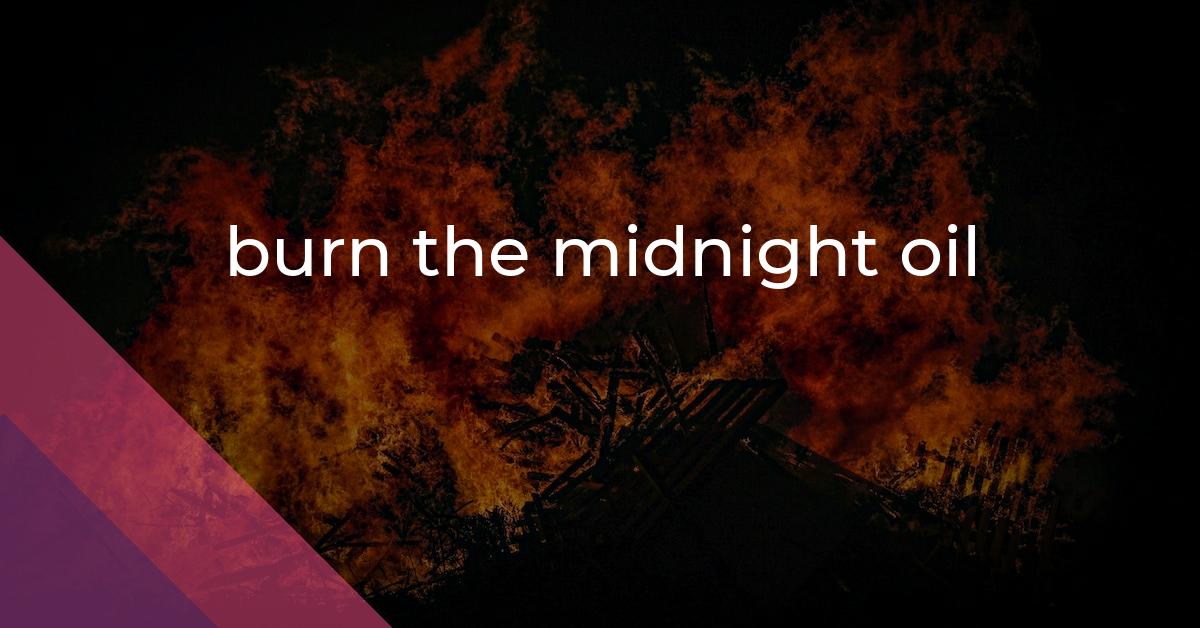burn the midnight oil: Idiom Meaning and Origin
What does ‘burn the midnight oil’ mean?
The idiom burn the midnight oil means to work late into the night, usually on intellectual or creative tasks.

Idiom Explorer
The idiom "knock oneself out" means to exert a lot of effort or work extremely hard. It is often used to encourage someone to do something with great enthusiasm or without holding back.
The idiom "keep someone up at night" means to cause someone to feel worried, anxious, or preoccupied, preventing them from sleeping peacefully.
The idiom "go to work" means to start doing the necessary tasks or activities to achieve a particular goal or result.
The idiom "go to town" means to work or proceed vigorously and with enthusiasm.
The idiom "go all out" means to put in maximum effort or to do something with full dedication and enthusiasm.
The idiom "down to the wire" means to go until the last moment or deadline without much time left. It is often used to describe situations that are intense, close, or uncertain until the very end.
The idiom "dead of night" refers to the darkest part of the night when it is completely silent and still. It is often used to describe a time when most people are asleep and there is a sense of eerie calmness.
The idiom "day lark" refers to someone who is energetic and active during the daytime, but lacks enthusiasm or energy during the evening or night. This phrase is often used to describe individuals who prefer to be productive and engaged in activities during daylight hours.
The idiom "Chinese overtime" refers to working long hours, often without additional pay or benefits, in a manner similar to how employees in China are sometimes expected to work. The phrase is usually used to describe a situation where someone is being overworked or working excessive hours.
The idiom "call it a night" means to decide or agree to end an activity or event for the evening, typically because it is late or no longer enjoyable.
Cracking the Code
The idiom "burn the midnight oil" is commonly used in English-speaking countries, particularly the United States, to describe working late into the night or staying up late to complete a task.
One possible origin of the idiom dates back to the invention of the oil lamp in the early 18th century. Before the widespread use of electricity, oil lamps were commonly used for nighttime illumination. People who needed to work or study late into the night had to keep the lamp burning until the early hours of the morning. The image of someone working diligently by the light of an oil lamp late at night eventually became associated with intense and dedicated effort, giving rise to the idiom "burn the midnight oil." Another theory suggests that the idiom may have originated from the historical practice of using whale oil for lamps. Before the discovery of alternatives like kerosene and electricity, whale oil was a widely used source of illumination. Burning the "midnight oil" could refer metaphorically to the careful and economical use of this valuable resource, paralleling the idea of working diligently and frugally.
The idiom "burn the midnight oil" is frequently used in academic and professional contexts, signifying the commitment and determination to put in the necessary effort and sacrifice leisure or sleep in order to achieve a desired goal. It implies a reverence for hard work and discipline in pursuit of success, as well as the recognition that some tasks require extra time and effort beyond the typical working hours. In addition to burning the midnight oil, there are several related idioms that convey different aspects of dedication, hard work, and time management.
The idiom "burn out" is often used to describe a state of physical or emotional exhaustion that arises from prolonged or excessive effort. It suggests that someone has worked so intensely and tirelessly that they have completely depleted their energy or enthusiasm. The image of burning out can be likened to a fire that consumes all its fuel and eventually goes out. Similarly, when someone "burns the candle at both ends," they are pushing themselves to work or engage in activities from early morning to late at night, without giving themselves time for rest or recuperation. This idiom implies a lack of balance and self-care, as well as the potential for burning out in the long run.
To "break one's back" is another idiom related to dedication and hard work. It refers to the immense physical or mental effort required to accomplish a task or overcome a challenge. The imagery of breaking one's back suggests a great deal of strain, exertion, and even sacrifice. This idiom emphasizes the demanding nature of the work and the willingness to push oneself beyond normal limits in order to achieve a desired outcome. Finally, the phrase "bright and early" is often used to describe someone who starts their day early, often with great enthusiasm or energy. It implies a proactive and productive approach to work, suggesting that someone is eager to begin their tasks as soon as possible and make the most of their day.
While the exact origins and etymology of the idiom "burn the midnight oil" remain uncertain, its significance and usage have become firmly established in the English language. This expression continues to resonate with individuals who understand the value of hard work, dedication, and the occasional need to burn the proverbial midnight oil to achieve their goals.
Example usage
Examples of how the idiom burn the midnight oil can be used:
1. Sarah had to burn the midnight oil to finish her research paper before the deadline.
2. The team worked late into the night, burning the midnight oil, to prepare for the important presentation.
3. Despite feeling tired, Alex continued to burn the midnight oil to work on his novel.
More "work" idioms



